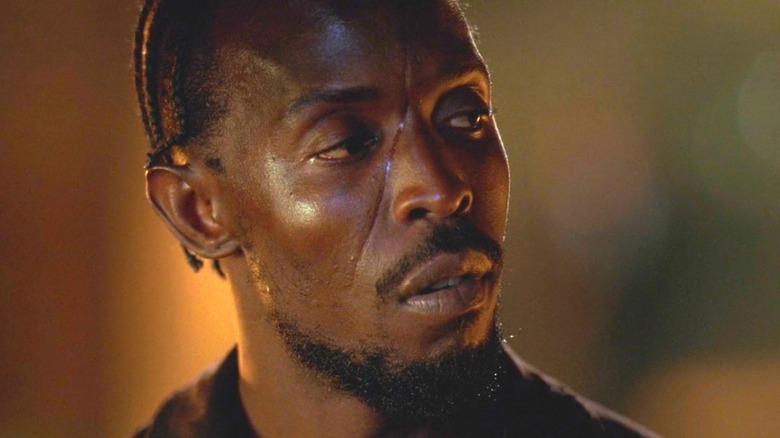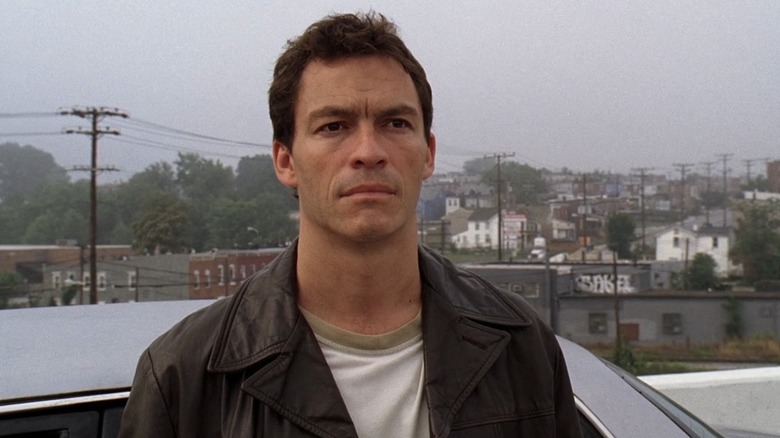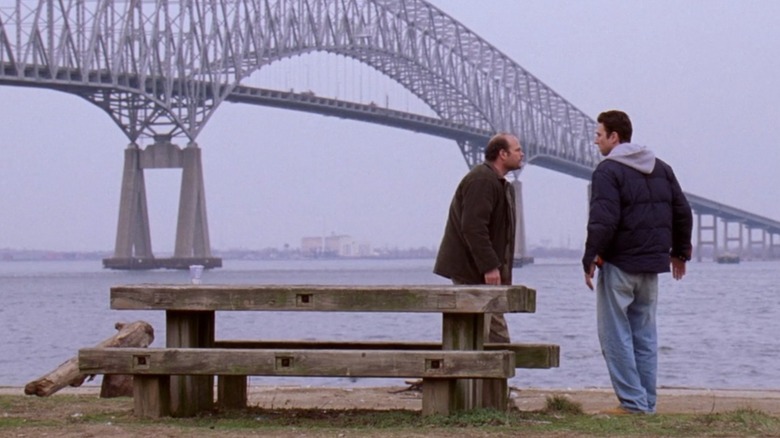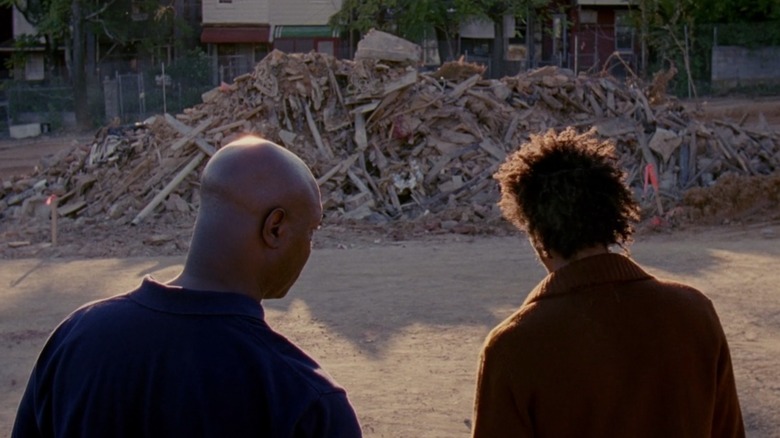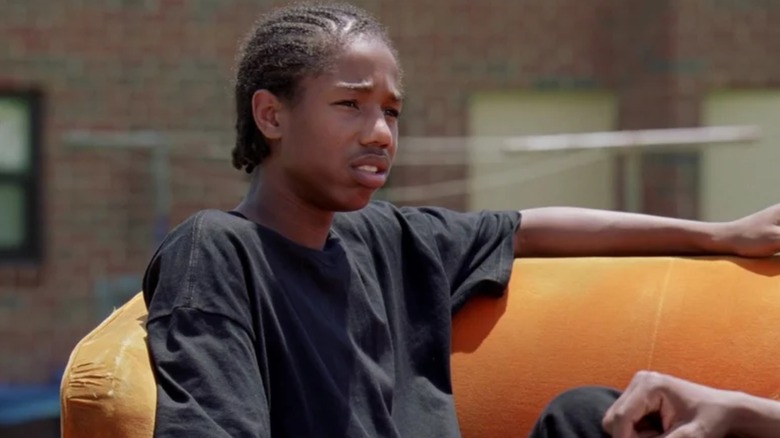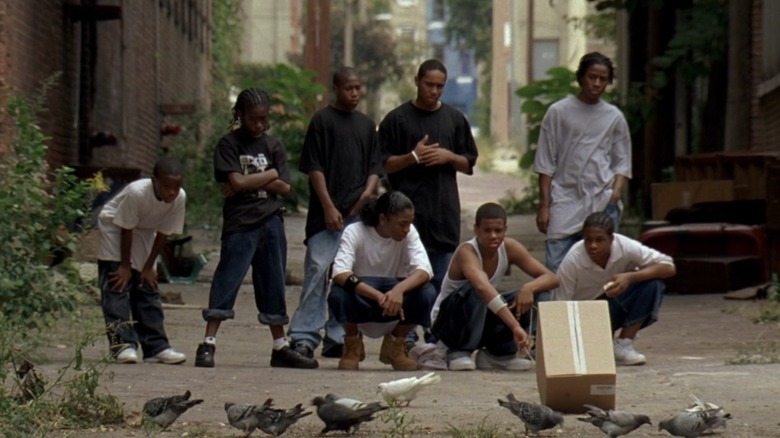Every Season Of The Wire Ranked From Worst To Best
Note: This post contains spoilers for "The Wire."
Is "The Wire" still one of the greatest TV shows of all time? David Simon's sprawling, complex portrait of Baltimore has appeared on multiple "best of" lists over the years, popping up near the top of masterpiece-filled rankings from outlets like Entertainment Weekly, Rolling Stone, Empire, and more. The HBO series, which really couldn't have worked before that channel's dominance in early 2000s, currently ranks sixth-highest of all time on IMDb (it's beat out only by "Breaking Bad," "Chernobyl," "Band of Brothers," and two "Planet Earth" shows), and despite never winning an Emmy, it's earned a Peabody, DGA and WGA awards, and a spot on the American Film Institute's Television Programs of The Year list three different times.
"The Wire" is no doubt a work of storytelling genius, and much of its tremendous effect is cumulative. The series starts at the street level of Maryland's biggest city, examining the effects of drugs and gang life before refocusing its attention — first on the city's ports, then its politics, then its school system, and finally, on its media. By series' end, Simon has weaved a tale of contrasting characters and disparate parts, all of which come together to hold a cracked mirror up to America's broken and corrupt institutions. Far from an anthology, the series follows characters from its first season — cops and criminals alike — through to their often-tragic ends.
Which parts of "The Wire" hold up best today, and which feel like its weakest links? As one of the show's chess-reference epigraphs puts it in season 1, "all the pieces matter," but it's fair to say that some matter more than others.
5. Season 5
Although "The Wire" earned much of its praise around the end of its run, that may have been less a testament to the final season's strengths and more a case of critics and viewers finally catching up to the series' overall excellence. Compared to its predecessors, season 5 is not great. Its newsroom-set plotline never reaches the emotional highs of past seasons, nor does it execute any impressive storytelling hat tricks in the way its predecessors, which often brought disparate plotlines together late in the season, so skillfully did.
More importantly, the news media plot of "The Wire" is just goofy. Much of it revolves around Detective McNulty's (Dominic West) invention of a fake serial killer; it's a stupid, outlandish lie, and one he devotes much of the season to maintaining. A decade after these episodes aired, the Trump-era "fake news" phenomenon made McNulty's hoax killer seem a bit more believable, but the plot still stands out as a heavy-handed stinker in an otherwise deft and clever series.
Perhaps season 5 of "The Wire" was never going to be able to match the storytelling power of what came before. By that point, some of the best characters from season 1 had died off, killed by a system that never gave them a chance to thrive in the first place. Those who remained weren't so much forced to change as they were forced to think about how little changes in the gears of the city's broken bureaucracy. That itself is tragic, but it's too often obscured by the season's messier, less satisfying moments. The season's thorny, hopeful finale is its high point.
4. Season 2
There's nothing particularly bad about the second season of "The Wire" (except maybe the plot about a duck dying of alcohol poisoning), but like season 5, it suffers greatly from inevitable comparisons to the season that came before it. In this case, the show's first season pulled off a pathos-filled narrative highwire act that introduced a slate of lovable characters before allowing the wheels of fortune to turn for each of them. In season 2, the drama focuses largely on three people who are neither as compelling nor as charming as the first round of crooks: Port worker Frank Sobotka (Chris Bauer), his nephew Nick (Pablo Schreiber), and his bumbling son Ziggy (James Ransone).
Though imports and exports aren't nearly as flashy a topic as drugs and gangs, "The Wire" season 2 still has elements worth loving. Bauer, who Simon would use again to great effect in his future series "The Deuce," puts in a no-nonsense performer as a union man whose sense of honor is at odds with his shady criminal underworld-related dealings. The case at the heart of the season, about the deaths of several trafficked women discovered in shipping containers in the Baltimore port, is also engrossing. While fans watching the series live no doubt experienced a sense of whiplash as the story moved away from the streets, the sophomore season also proved that "The Wire" was capable of building on the foundation it started, creating a layer cake of critical social commentary and American tragedy.
If season 2 has one fatal flaw aside from its charisma-free new characters, it's that it sometimes leans too far into its own dense world-building. Among all the talks about unions, trades, and contracts, there are few big emotional moments to latch onto. Still, aspects of the season, like a scene in which Frank Sobotka points to the now-fallen Francis Scott Key Bridge as an enduring symbol of the perseverance of the working class, hit harder now than ever.
3. Season 3
Season 3 of "The Wire" may be referenced in brief as "the local politics season," but the series' midpoint offers a lot more than scenes of Aiden Gillen's Tommy Carcetti sleazing his way up the political ladder. It's also the season that brought us the final showdown between classy criminal Stringer Bell (Idris Elba), legendary robber Omar Little (Michael K. Williams), and crime kingpin Avon Barksdale (Wood Harris), who is paroled partway through the season. The show's decision to put the focus back on these much-loved characters isn't fan service, but part of a multi-act vision for a series that, in a vital subversion of most police shows that came before it, would ultimately make its audiences love the criminals at its heart far more than the cops who hunt them.
"Middle Ground," the penultimate episode of season 3 that sees Stringer meet his fate, is one of the series' best-ever outings. The hour is riveting and emotional, thick with ambitious ideas about capitalism, government bureaucracy, and the carceral system. Simon's ambitious ideas for the series can occasionally become unwieldy, but this time around, every element of the story he aims to tell is perfectly controlled and wildly effective.
If "Middle Ground" pulls the rug out from under viewers by bringing what seemed poised to be a series-long conflict to a close, then the episode that follows it, "Mission Accomplished," does something even more impressive by setting up a new, even better era for the series. Stringer's death doesn't feel like the tidy success Baltimore cops expected, as some of them lost faith in their own institution along the way as the depths of its corruption, and their own capacity for it, was revealed. There's a painfully bittersweet feeling to much of season 3, from scenes of Omar-idolizing kids pretending to shoot each other in the streets to sweet addict Bubbles' (Andre Royo) final observation that the rubble of legal drug zone Amsterdam looks like "they just took a big eraser and rubbed it across." Season 3 reveals "The Wire" as a show not full of bad people and decent people, but of liars, survivors, and above all else, poets.
2. Season 1
The first season of "The Wire" isn't just a brilliant first chapter of Simon's larger story — it's an incredible, bold work of cinematic storytelling all on its own. From the moment it opens with McNulty seated beside a murder witness, waxing poetic about the existential angst of being nicknamed "Snot," to its closing scene, in which Omar robs a couple of unsuspecting dealers in New York, the first chapter of "The Wire" lives up to the title the series would eventually be christened with: the Great American Novel for television.
Thrilling, stylish, and tremendously well-written and acted, season 1 introduces viewers to a cadre of fantastic characters on both sides of the law. At Baltimore PD, we met drunk but dogged detective McNulty, his smartass partner Bunk (Wendell Pierce), no-nonsense boss Daniels (the late, great Lance Reddick), and a ragtag temporary narcotics unit featuring standout actors like Clarke Peters and Seth Gilliam. Meanwhile, in the Baltimore projects, Barksdale and Stringer Bell ran a drug empire with the help of D'Angelo (Larry Gilliard Jr.), while thief and local legend Omar played only on the side of his self-interest.
The season's secret weapon is Wallace, a kind and innocent Black boy working under Barksdale despite looking like he should be in middle school. Played by Michael B. Jordan in his breakout role, Wallace quickly became the heart of the season — before becoming its collateral damage. There are plenty of standout moments in the series, but for my money, none hit nearly as hard as the scene in the penultimate episode of season 1, when a disbelieving D'Angelo repeats "Where's Wallace?" to the police who already know he's dead. "The Wire" is too complex to boil down to one central thesis, but it returns again and again to the idea of senseless, public loss — of money, resources, trust, and in too many cases, lives.
1. Season 4
After a dry third season occasionally got lost in the sauce examining local politics, the show's fourth and finest installment brought audiences' attention back to characters worth rooting for. The show's most intentionally edifying season, its fourth seems determined to give human faces to upsetting real-life statistics. Its first episode opens with a group of young Black teens whose proximity to drugs and crime hasn't yet dulled their love for life and innocent fun. They catch pigeons, eat ice cream, and prank each other with water balloons. The boys also go to school, where former cop Prez (Jim True-Frost) is their naive first-time teacher. By season's end, three of the four boys will be drug dealers, killers, or lost in the foster care system, while just one leaves the life of crime.
Far from the fear-mongering PSA it sounds like, season 4 is a 13-episode masterpiece that lays bare Simon's vision of a country trapped in a purgatory of self-destructive repetition. With playwright Eric Overmyer and journalist David Mills newly on board, scripts for the series are sharper than ever, while a talented cast of young actors bring the show's "boys of summer" to life. By this point, you'd think "The Wire" fans would be too cynical to hope for a happy ending for any new character, but somehow, the opposite is true here: We're compelled to hope harder for these boys than for anyone else, and as such, we're more heartbroken than ever when their dreams begin to falter.
Aside from its thorough and scathing criticisms of America's school and foster care systems, "The Wire" season 4 also continues building one of the series' best overarching plots: the legend of Omar Little. The stick-up man is by this point the best player in the game, but when he ends up at odds with kingpin Marlo (Jamie Hector), Omar's ability to wriggle out of any situation (and blow away anyone who comes for him) is tested. More than other seasons, season 4 manages to weave each of its brilliant pieces together to form a powerful, breathtaking mosaic of life in the most over-policed and under-supported corners of America.
